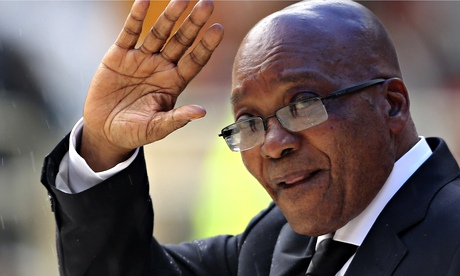ANC breezes to triumph but striking workers stand in way
President Jacob Zuma will wake up satisfied today, after election results yesterday confirmed his party’s continued domination of the South Africa’s political landscape. But there is still one key issue to be decided: the extent of the ANC’s parliamentary majority, which will affect its ability to implement its desired policies.
Yesterday, in preliminary results the ANC had 63 percent. In 2009’s previous election, the party fell just short of a two-thirds majority in Parliament at 65.9 percent, which some analysts argue hurt its ability to govern.
With the country’s economy growing slugglishy of late, Zuma has indicated that this time the economy is priority number one. His masterplan is the “National Development Plan” — but he will need a mandate to push it through.
According to the programme, Zuma and the ANC will prioritize growth through infrastructure, market reform, the encouragement of foreign investment and, perhaps more optimistically, by stopping labour unrest, starting with the country’s unions. It’s in this latter area, that it seems a real battle is shaping up.
Zuma’s business-friendly future plans are said to have alarmed the industrial groups and the unions have attacked the 20-year programme in the press. An unnamed BBC correspondent yesterday said that unions had told him they were considering breaking their alignments with political parties to form their own.
Union unrest is nothing new for South Africa. The most well-known recent example came back in August 2012, when 34 striking miners were killed by South African police as they protested in demand of a “living wage” from platinum company Lonmin at the Marikana mine close to Rustenburg. The shocking incident has popped back into public consciousness of late, with the release of a new documentary, Miners Shot Down, by filmmaker Rehad Desai.
The unrest at Marikana has continued to pervade the sector. Most of the country’s platinum miners, led by the Association of Mineworkers and Construction Union (AMCU) have been on strike for the past 15 weeks — nearly four months — as they ask for higher wages. The strike has hit production hard, reportedly causing production to drop 40 percent globally.
Zuma rounded on the AMCU just days before the election, telling workers that they risked losing their jobs as a result of the industrial action. Unsurprisingly, mining companies backed up the president, accusing the AMCU of intimidating its workers into protesting.
AMCU President Joseph Mathunjwa responded angrily to the allegations, saying his union’s workers were being “exploited” by a “platinum cabal.
Some analysts have put the unrest down to the power of the AMCU, which has become the most powerful union in the platinum sector, taking over from the National Union of Mineworkers (NUM), a union grouping that used to be a close ally of the ANC. In 2012, a series of violent incidents took place as part of a turf war between the two groups, with deaths on both sides.
It remains to be seen what Zuma’s next move is, but a lot will depend on the strength of his government’s ability to govern. Some analysts have suggested he will move to seek court action to end the strikes and would perhaps even deploy security forces to clear the protesters.
But such a move would be rife with symbolism and most certainly, just the beginning of a long battle.
Originally published in the Buenos Aires Herald, on Wednesday, May 6, 2014.
Link: http://www.buenosairesherald.com/article/158981/zuma-wins-in-south-africa–%E2%80%94-now-real-fight-begins.
© J. GRAINGER, 2014

